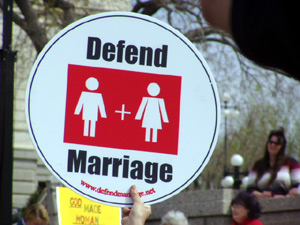READER RESPONSE -- The slippery slopes (plural) of the same-sex marriage debate
Posted by Craig Westover | 12:16 PM |Doug (Bogus Gold) responded to my post “Smoking Bans -- A case of ‘What is seen and what is unseen’” with what to someone less insightful than Doug might seem a strangely titled post -- “Things Seen, Unseen, and Marriage.”
Doug gets it.
In the grand scheme of things, whether or not one can smoke a cigarette in a bar is a pretty trivial concern compared to how individuals relate and express their most intimate connection, their fundamentally humanity. And yet the issues are connected. How we address the little things in life ultimately affect how we think about the really important things.
That said, Doug’s post presents a valid challenge --

Craig and I have had a disagreement regarding gay marriage. To whit, he's more or less for it, and I'm more or less agin' it.Let’s start with the point of agreement. This paragraph from Bastiat --
The point I would like to call attention to is that the "unseen" aspect of altering the institution of marriage might have an impact as significant as any unseen aspect of an economic change.
I don't consider this an insignificant parallel. I consider it very significant to the core of the defense of traditional marriage.
I would welcome the input of Craig or other likeminded folks in response to this point.
There is only one difference between a bad economist and a good one: the bad economist confines himself to the visible effect; the good economist takes into account both the effect that can be seen and those effects that must be foreseen.In the two paragraphs that follow, Bastiat takes his argument into the realm that Doug wants to go.
Yet this difference is tremendous; for it almost always happens that when the immediate consequence is favorable, the latter consequence are disastrous, and vice versa. Whence it follows that the bad economist [philosopher/politician/blogger] pursues a small present good that will be followed by a great evil to come, while the good economist [philosopher/politician/blogger] pursues a great good to come, at the risk of a small present evil.
The same thing, of course, is true of health and morals. Often, the sweeter the first fruit of a habit, the more bitter are its later fruits: for example, debauchery, sloth, prodigality. When a man is impressed by the effect that is seen and has not yet learned to discern the effects that are not seen, he indulges in deplorable habits, not only through natural inclination, but deliberately.
 There’s an awful lot in those two paragraphs. And I’m on dangerous ground here, because I’m going to try and put Doug’s position into Bastiat's terms. I also have a nice little debate going on the John Adams Blog that faces an argument similar to Doug’s.
There’s an awful lot in those two paragraphs. And I’m on dangerous ground here, because I’m going to try and put Doug’s position into Bastiat's terms. I also have a nice little debate going on the John Adams Blog that faces an argument similar to Doug’s.Doug [IMO] argues that whatever small present good might be perceived coming from recognizing same-sex unions conceals latter disastrous consequences. He sees same-sex marriage recognition as necessarily undermining traditional marriage and the value of male/female relationships. “Necessarily” is not a merely hyperbolic word: “Same-sexidness,” even in a love-based relationship, cannot duplicate the union of two people of opposite sex, nor, even through technology or adoption, can it approximate the natural basis for family formation.
While I don’t believe Doug would classify a love-based same-sex relationship in the same category as “debauchery, sloth, prodigality,” he would contend that because a same-sex relationship is fundamentally a non-procreative relationship and a non-differentiated relationship (the union of male and female partners), a same-sex relationship is “necessarily” a hedonistic relationship in the sense that its primary purpose is the personal gratification of the partners.
The small present good of equality before the law (my contention) is (Doug‘s contention) outweighed by equating personal gratification with the greater scope of male/female relationships, which (Doug’s contention) will produce the disastrous latter consequence of a more licentious society that replaces sacramental responsibility with personal gratification.
That is a logical argument moving from the seen to the unseen. However there is alternative view of the unseen that departs from the point from which Doug starts -- a point made by Dale Carpenter, here; that is there are three stock responses to a slippery slope argument.
1) The destination(s) at the bottom of the slope aren’t so bad, so there’s no need to worry.Carpenter does not believe the second of these two points will convince those opposed to same-sex unions to change there minds. He may be right, but nonetheless, I believe it to be a logically compelling point of departure.
2) The slope slides both ways and the other side might be worse.
3) There is a principled stopping point that prevents us from reaching the feared bottom of the slope.
From that departure point, the other side of the slope created by surfacing of the gay marriage issue, is that of how far ought we enable government to essentially create rights for some groups and deny them to others? My argument to Doug is that as individuals we have control over how far down the licentious slope we slide. The further down the slope of government control we slide, the less individual control we have and the broader the consequences.
If same-sex unions are so threatening that they can destroy traditional conservative values merely by their existence, then those values can’t mean very much. Taking Doug’s point that same-sex marriage adds yet another element to an environment already brimming with influences that would destroy the society conservatives would like to see, those same influences also motivate the resolve to strengthen and reaffirm those values.
[I am intentionally ignoring the role of the education system: I think we should reform the education system before we start curtailing individual choice.]
It can be reasonably argued that a great relaxation of moral stress in the post-war 1950s, the lack of any values-based conflict, weakened the need to stress values, resulting in much of my baby-boom generation that through lack of mental exercise lacks the character to make the kind of value-based distinction that Doug does.
However, slipping down the other side of the slope, using government to enforce/re-enforce values through public policy will result in as disastrous a set of consequences as that created by a values-apathetic society, which has created the culture crisis Doug observes.
As the welfare state robs individuals of the understanding the need for and capacity of compassion, a state that legislatively relegates groups to a second-class status robs individuals of understanding the need for and the capacity of formulating and living by a consistent moral code.
I see that as a more disastrous consequence and a less preventable consequence (given government has the guns and will not always be in the control of “my people”) than the danger Doug fears.
I don’t dismiss Doug’s fears as groundless, a mistake I think many same-sex marriage advocates make. I simply believe that individuals have the responsibility to ensure they can support themselves economically, they have the same responsibility to support themselves morally. Neither function can be outsourced to government.
And therein, lies our difference.

<< Home